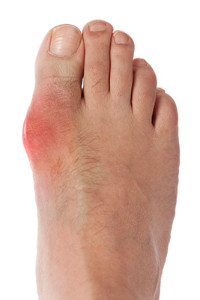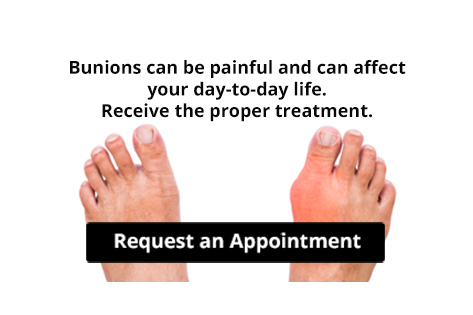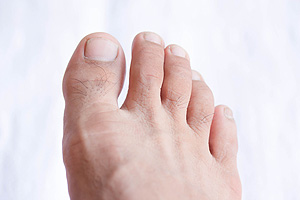August 2019
Are Bunions Affecting Your Everyday Life?
Possible Causes of Neuropathy
A common symptom of neuropathy is numbing and tingling sensations in the hands and feet. It may occur as a result of nerve damage that can come from having diabetes, and can cause severe pain and discomfort. Additional symptoms often include cramps that are felt in the calf muscles, loss of balance, and weakness in the feet. It may be difficult to walk alone, and performing daily activities may be hard to accomplish. It can be beneficial to add safety measures in your home which include installing grab bars in the shower and bathroom areas, and it may also help to increase lighting. Effective treatment options can include incorporating nutritional supplements as part of a healthy eating pattern, and performing light exercise routines. If you have any symptoms of neuropathy, it is strongly suggested that you consult with a podiatrist who can guide you toward the correct treatment.
Neuropathy
Neuropathy can be a potentially serious condition, especially if it is left undiagnosed. If you have any concerns that you may be experiencing nerve loss in your feet, consult with Dr. John C. Lawlor from Florida. Our doctor will assess your condition and provide you with quality foot and ankle treatment for neuropathy.
What Is Neuropathy?
Neuropathy is a condition that leads to damage to the nerves in the body. Peripheral neuropathy, or neuropathy that affects your peripheral nervous system, usually occurs in the feet. Neuropathy can be triggered by a number of different causes. Such causes include diabetes, infections, cancers, disorders, and toxic substances.
Symptoms of Neuropathy Include:
- Numbness
- Sensation loss
- Prickling and tingling sensations
- Throbbing, freezing, burning pains
- Muscle weakness
Those with diabetes are at serious risk due to being unable to feel an ulcer on their feet. Diabetics usually also suffer from poor blood circulation. This can lead to the wound not healing, infections occurring, and the limb may have to be amputated.
Treatment
To treat neuropathy in the foot, podiatrists will first diagnose the cause of the neuropathy. Figuring out the underlying cause of the neuropathy will allow the podiatrist to prescribe the best treatment, whether it be caused by diabetes, toxic substance exposure, infection, etc. If the nerve has not died, then it’s possible that sensation may be able to return to the foot.
Pain medication may be issued for pain. Electrical nerve stimulation can be used to stimulate nerves. If the neuropathy is caused from pressure on the nerves, then surgery may be necessary.
If you have any questions, please feel free to contact one of our our offices located in Cape Coral and LaBelle, FL . We offer the newest diagnostic and treatment technologies for all your foot care needs.
Read more about NeuropathyPossible Treatment of Ingrown Toenails
 The medical name for an ingrown toenail is referred to as onychocryptosis. It is a painful condition of the big toe, and it occurs as the sides of the nail grow into the surrounding skin. The symptoms that are associated with this ailment often consist of severe pain and swelling, in addition to becoming red and inflamed. There are several reasons why ingrown toenails may develop. These can include wearing shoes that do not have adequate room for the toes to move freely in, trimming the toenails incorrectly, or if an injury has occurred to the nail. Treatment techniques may consist of splinting the nail, as this may help to protect the skin surrounding the affected nail. Additionally, if the ingrown toenail becomes infected, surgery may be an option to consider. If you have developed this condition, it is advised to seek the counsel of a podiatrist who can properly diagnosis and treat this ailment.
The medical name for an ingrown toenail is referred to as onychocryptosis. It is a painful condition of the big toe, and it occurs as the sides of the nail grow into the surrounding skin. The symptoms that are associated with this ailment often consist of severe pain and swelling, in addition to becoming red and inflamed. There are several reasons why ingrown toenails may develop. These can include wearing shoes that do not have adequate room for the toes to move freely in, trimming the toenails incorrectly, or if an injury has occurred to the nail. Treatment techniques may consist of splinting the nail, as this may help to protect the skin surrounding the affected nail. Additionally, if the ingrown toenail becomes infected, surgery may be an option to consider. If you have developed this condition, it is advised to seek the counsel of a podiatrist who can properly diagnosis and treat this ailment.
Ingrown toenails can become painful if they are not treated properly. For more information about ingrown toenails, contact Dr. John C. Lawlor of Florida. Our doctor can provide the care you need to keep you pain-free and on your feet.
Ingrown Toenails
Ingrown toenails occur when a toenail grows sideways into the bed of the nail, causing pain, swelling, and possibly infection.
Causes
- Bacterial infections
- Improper nail cutting such as cutting it too short or not straight across
- Trauma to the toe, such as stubbing, which causes the nail to grow back irregularly
- Ill-fitting shoes that bunch the toes too close together
- Genetic predisposition
Prevention
Because ingrown toenails are not something found outside of shoe-wearing cultures, going barefoot as often as possible will decrease the likeliness of developing ingrown toenails. Wearing proper fitting shoes and using proper cutting techniques will also help decrease your risk of developing ingrown toenails.
Treatment
Ingrown toenails are a very treatable foot condition. In minor cases, soaking the affected area in salt or antibacterial soaps will not only help with the ingrown nail itself, but also help prevent any infections from occurring. In more severe cases, surgery is an option. In either case, speaking to your podiatrist about this condition will help you get a better understanding of specific treatment options that are right for you.
If you have any questions please feel free to contact one of our our offices located in Cape Coral and LaBelle, FL . We offer the newest diagnostic and treatment technologies for all your foot and ankle needs.
Read more about Ingrown ToenailsSwollen Feet Are Common During Pregnancy
 Many pregnant women experience swollen and achy feet during their pregnancies. This is a result of the growing fetus, in addition to the body producing excess fluid. There are methods that can be implemented which can help to reduce discomfort in the feet that is often experienced during the latter stages of pregnancy. These include elevating your feet as often as possible throughout the day, limiting your sodium intake, and stretching the calf muscles and toes. Some women find it helpful to wear compression stockings, as these may be beneficial in controlling persistent swelling. If you would like additional information about how pregnancy can affect the feet, please consult with a podiatrist.
Many pregnant women experience swollen and achy feet during their pregnancies. This is a result of the growing fetus, in addition to the body producing excess fluid. There are methods that can be implemented which can help to reduce discomfort in the feet that is often experienced during the latter stages of pregnancy. These include elevating your feet as often as possible throughout the day, limiting your sodium intake, and stretching the calf muscles and toes. Some women find it helpful to wear compression stockings, as these may be beneficial in controlling persistent swelling. If you would like additional information about how pregnancy can affect the feet, please consult with a podiatrist.
Pregnant women with swollen feet can be treated with a variety of different methods that are readily available. For more information about other cures for swollen feet during pregnancy, consult with Dr. John C. Lawlor from Florida. Our doctor will attend to all of your foot and ankle needs.
What Foot Problems Can Arise During Pregnancy?
One problem that can occur is overpronation, which occurs when the arch of the foot flattens and tends to roll inward. This can cause pain and discomfort in your heels while you’re walking or even just standing up, trying to support your baby.
Another problem is edema, or swelling in the extremities. This often affects the feet during pregnancy but tends to occur in the later stages.
How Can I Keep My Feet Healthy During Pregnancy?
- Wearing orthotics can provide extra support for the feet and help distribute weight evenly
- Minimize the amount of time spent walking barefoot
- Wear shoes with good arch support
- Wear shoes that allow for good circulation to the feet
- Elevate feet if you experience swelling
- Massage your feet
- Get regular, light exercise, such as walking, to promote blood circulation to the feet
If you have any questions please feel free to contact one of our our offices located in Cape Coral and LaBelle, FL . We offer the newest diagnostic and treatment technologies for all your foot and ankle needs.
Read more about Foot Care for Pregnant WomenPainful Gout and What May Cause It
 Patients who have experienced the medical condition that is referred to as gout are often aware of the severe pain and discomfort it may cause. It occurs as a result of genetic factors, or if foods are eaten in excess that have elevated levels of purines. This can cause crystals to form in the joints of the big toe, and it can often be debilitating. After a proper diagnosis is performed which consists of extracting a small amount of fluid from the affected joint, the correct treatment can begin. There are specific medications that provide relief from this condition. Additionally, research has indicated that it may be beneficial to incorporate healthy eating habits into your daily routine. These might include limiting red meats, shellfish, and cutting back on excess alcohol. If you think you have gout, it is advised that you seek the counsel of a podiatrist who can recommend the correct form of treatment.
Patients who have experienced the medical condition that is referred to as gout are often aware of the severe pain and discomfort it may cause. It occurs as a result of genetic factors, or if foods are eaten in excess that have elevated levels of purines. This can cause crystals to form in the joints of the big toe, and it can often be debilitating. After a proper diagnosis is performed which consists of extracting a small amount of fluid from the affected joint, the correct treatment can begin. There are specific medications that provide relief from this condition. Additionally, research has indicated that it may be beneficial to incorporate healthy eating habits into your daily routine. These might include limiting red meats, shellfish, and cutting back on excess alcohol. If you think you have gout, it is advised that you seek the counsel of a podiatrist who can recommend the correct form of treatment.
Gout is a foot condition that requires certain treatment and care. If you are seeking treatment, contact Dr. John C. Lawlor from Florida. Our doctor will treat your foot and ankle needs.
What Is Gout?
Gout is a type of arthritis caused by a buildup of uric acid in the bloodstream. It often develops in the foot, especially the big toe area, although it can manifest in other parts of the body as well. Gout can make walking and standing very painful and is especially common in diabetics and the obese.
People typically get gout because of a poor diet. Genetic predisposition is also a factor. The children of parents who have had gout frequently have a chance of developing it themselves.
Gout can easily be identified by redness and inflammation of the big toe and the surrounding areas of the foot. Other symptoms include extreme fatigue, joint pain, and running high fevers. Sometimes corticosteroid drugs can be prescribed to treat gout, but the best way to combat this disease is to get more exercise and eat a better diet.
If you have any questions please feel free to contact one of our our offices located in Cape Coral and LaBelle, FL . We offer the newest diagnostic and treatment technologies for all your foot and ankle needs.
Read more about Everything You Need to Know About Gout









